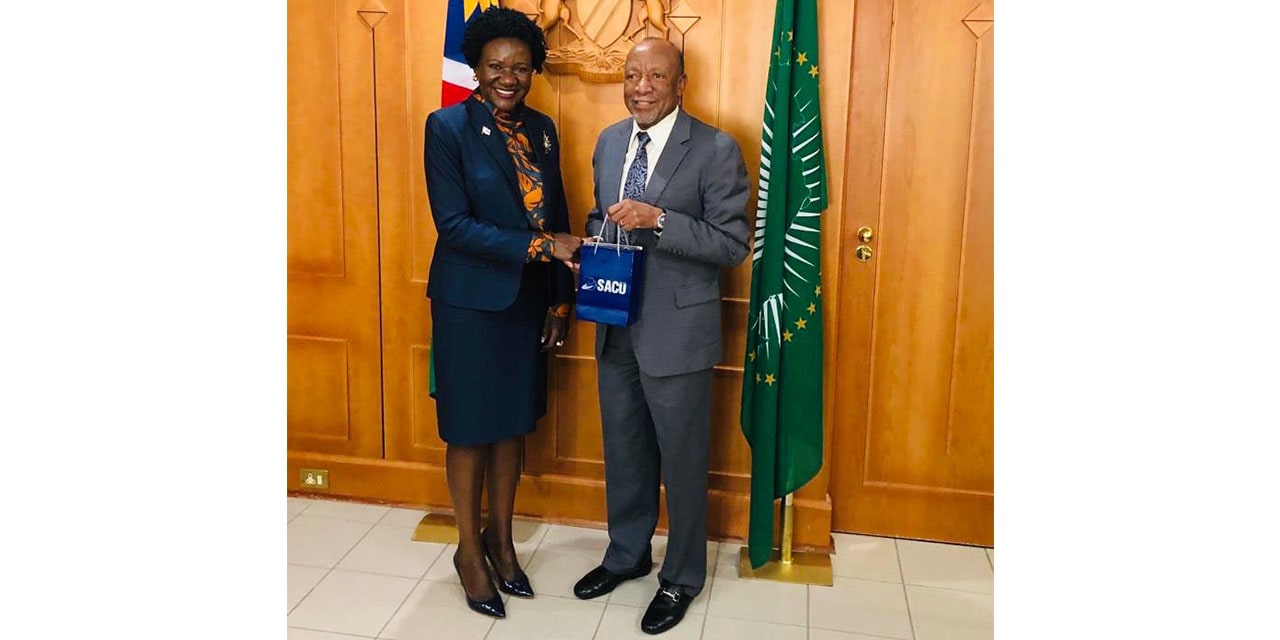Tujoromajo Kasuto
Vice President, Nangolo Mbumba called for the redoubling of efforts for regional economic integration in the aftermath of the Covid-19 pandemic that has disrupted efforts toward economic recovery in Namibia and other SACU member states over the last two years.
He made this call during a visit to the Southern African Customs Union headquarters in Windhoek, where he was informed of how the fallout from the pandemic depleted SACU revenues.
The VP asserts that It is therefore imperative that the governments together with all its stakeholders, including SACU, redouble efforts and work together to strengthen the fight towards economic recovery through regional economic integration. Mbumba commended and recognised SACU, as one of the key strategic partners working, among others, towards a post-COVID economic recovery.
“As you are all aware, post-COVID-19 recovery requires a committed focus on economic transformation, competitiveness, collaboration and diversification. These are all achievable through strategic partnership and enhanced cooperation going forward,” he said.
It is in this spirit that President Hage Geingob declared 2022 the Year of Reimaging, which entails forming or creating a new mental picture or image of the world, he added.
The recovery process, he said, should involve restoring, refocusing and rededicating all efforts to achieve a collective mission.
Namibia officially became a member of SACU following its independence in 1990. The decision to join SACU was informed by, among others, the recognition and importance of the interlinkages between Namibia’s economy and that of its trading partners in the customs union.
Embracing regional integration was seen as a vehicle for overcoming the constraints of a small domestic market, integrating into the global economy, and, as a means to facilitate the structural transformation of the national economy.
Paulina Elago, SACU Executive Secretary shared that the union is currently focusing on the implementation of its Refocused Work Programme which prioritises industrialization as SACU’s overarching objective.
This, she said, is to be attained through four distinct priorities, namely:the development of regional value chains, investment attraction and export promotion; financing for industrialization; trade facilitation and logistics; as well as the implementation of the African Continental Free Trade Area (AfCFTA). Through industrialisation, SACU seeks to deepen regional economic integration through the development of regional value chains, Elago elaborated.
In this regard, Elago noted that SACU member states have also adopted a vision for industrialisation which seeks “to build a diversified, competitive, sustainable and equitable industrial base that supports structural transformation and the economic integration of the SACU region”.
To attain this vision, three priority sectors, including sub-sectors, that will underpin the region’s industrialisation objectives have been selected.
These are: Agro-Processing , which include leather and leather products, meat and meat products, fruits and vegetables, Textiles and Clothing and Pharmaceuticals, Cosmetics and Essential Oils.
These priority sectors were selected as a result of their potential to benefit the region in terms of value addition, employment creation, as well as their overall contribution to economic development among others.
Elago highlighted that SACU to date has successfully convened sectoral roundtables in these priority sectors, which in turn will culminate in a hybrid Ministerial Investment Roundtable which is scheduled to take place on 12-13 April 2022, in Gaborone, Botswana; under the theme “Positioning SACU as an industrial, investment, manufacturing and innovation hub for the African Continent and beyond”.
The Roundtable forms part of the key deliverables in the broader SACU Industrialisation, Export and Investment Promotion; and the Trade Facilitation and Logistics Programme.
Its objective is to showcase and profile the region’s development potential as well as investment and export opportunities in the targeted priority sectors.
It will also provide the private sector and industry players a unique opportunity to engage SACU Trade Ministers and policy makers on measures and possible interventions that will enable the development of cross-border value chains so as to take full advantage of the market access opportunity presented by the AfCFTA.
The participation at the Roundtable is expected to include the private sector, policy makers and potential investors from the SACU region and beyond.
In the area of Trade Facilitation and Logistics, SACU seeks to create a seamless trade environment for cross-border movement of goods. According to Elago this will be done through the application of innovative and emerging technologies to streamline processes, enhance collaboration, while also detecting and deterring illicit trade in goods within the Common Customs Area.
It will also address obstacles and hindrances facing businesses that are moving goods across the borders in the Common Customs Area and beyond.
The goal is to develop trade facilitation solutions that are practical, transformational, measurable, and geared towards enhanced efficiency and reduced transaction costs.




